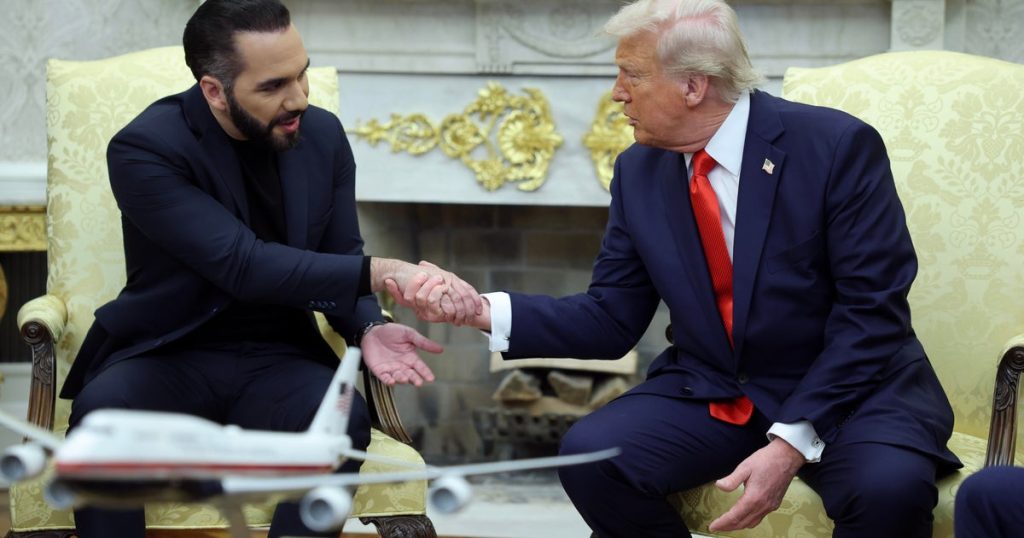In a complex diplomatic incident, El Salvador’s President Nayib Bukele has firmly rejected the potential return of Kilmar Abrego Garcia to the United States. This follows Attorney General Pam Bondi‘s declarations regarding U.S. involvement in facilitating the return of the individual mistakenly deported to El Salvador. The situation has raised numerous legal and human rights questions, all while bringing to the forefront ongoing U.S.-El Salvador relations, particularly in the context of crime and deportation policies.
| Article Subheadings |
|---|
| 1) The Controversial Deportation |
| 2) Officials’ Statements and Responsibilities |
| 3) Legal Implications and Human Rights Concerns |
| 4) The Role of Diplomacy in Crime Management |
| 5) Future of U.S.-El Salvador Relations |
The Controversial Deportation
The situation revolving around Kilmar Abrego Garcia began when he was mistakenly deported from the United States to El Salvador, a decision that has sparked considerable debate. The individual, who previously resided in Maryland with his family, allegedly has no ties to gangs or violent crime, as asserted by his attorneys. Officials from the Trump administration have acknowledged the deportation as an administrative error, yet the implications resonate far beyond clerical mistakes. The fallout centers around questions of justice, legality, and humanitarian considerations, marking a turning point in deportation policies and the treatment of individuals in the immigration system.
Officials’ Statements and Responsibilities
President Nayib Bukele has taken a staunch position, asserting that returning Abrego Garcia to the U.S. is untenable. During a press conference at the Oval Office, he raised questions about the practicality and legality of such actions, dismissing the notion that El Salvador could simply transport a prisoner back to the U.S. He stated,
“How can I return him to the United States? I smuggle him into the United States or what do I do? Of course, I’m not going to do it. The question is preposterous.”
. Conversely, Pam Bondi underscored that the responsibility to facilitate the return lies with El Salvador while emphasizing that Abrego Garcia was in the U.S. illegally. This juxtaposition underlines the complexities officials face, as both the U.S. and El Salvador hold differing views on accountability and the legal pathways for such cases.
Legal Implications and Human Rights Concerns
The legal landscape surrounding Abrego Garcia’s case raises significant concerns. The U.S. Supreme Court has mandated that the Trump administration must enable the facilitation of his release from El Salvador, which appears straightforward but becomes convoluted when considering the intent of both nations. The involved parties have cited constitutional constraints in the context of extradition; according to experts, sending U.S. citizens to foreign prisons triggers serious legal issues under U.S. law. A precedent from 1936 states that extraditation cannot occur without acts of Congress. The implications of this case highlight the delicate balance between national security, legal accountability, and human rights, particularly as Abrego Garcia‘s wife, Jennifer Vasquez Sura, expressed dismay at the political maneuvering affecting her husband’s situation.
The Role of Diplomacy in Crime Management
The diplomatic relationship between the U.S. and El Salvador has long been fraught with tension, significantly concerning crime management and deportation policies. During the same Oval Office meeting, President Donald Trump indicated aspirations of sending some U.S. citizens convicted of violent crimes to El Salvador, claiming it may present a cost-effective solution to criminal rehabilitation. However, experts caution against the legal ramifications and ethical implications of such a measure, suggesting that the fundamental rights of individuals must not be sacrificed for policy efficiency. As both leaders work to address crime and terrorism, this meeting and others like it symbolize an attempt to forge a stronger collaborative approach while navigating complex moral and legal landscapes.
Future of U.S.-El Salvador Relations
As the situation develops, the future of U.S.-El Salvador relations remains uncertain. Although Nayib Bukele characterized the bilateral relationship as eager to combat crime and terrorism, the ongoing controversy regarding Abrego Garcia serves as a potential strain on these efforts. The conflation of deportation policies with broader diplomatic goals fuels skepticism about the true intentions behind such discussions. The upcoming proceedings and international reactions will likely shape the nature of cooperation between the two nations and provide insights into how each government prioritizes human rights and legal frameworks in practice.
| No. | Key Points |
|---|---|
| 1 | President Nayib Bukele has refused to return Kilmar Abrego Garcia to the United States following his erroneous deportation. |
| 2 | U.S. Attorney General Pam Bondi stated that the decision rests with El Salvador. |
| 3 | The Supreme Court has required the Trump administration to facilitate Garcia’s release from custody. |
| 4 | Legal experts warn of serious constitutional concerns surrounding potential deportation of U.S. citizens. |
| 5 | The outcome of Abrego Garcia’s case may impact future U.S.-El Salvador relations significantly. |
Summary
The situation concerning Kilmar Abrego Garcia encapsulates the complexities of immigration, crime, and diplomatic relations in the 21st century. As the United States navigates its obligations to its citizens and its foreign policy commitments, the reactions from El Salvador under President Bukele highlight a growing assertiveness in international legal matters. Moving forward, how both countries resolve this case could set critical precedents for future interactions, influencing not only the lives affected but also the broader context of U.S. foreign policy in Central America.
Frequently Asked Questions
Question: What key error led to Kilmar Abrego Garcia’s deportation?
Abrego Garcia’s deportation was an administrative mistake made by U.S. immigration authorities, where he was wrongfully sent to El Salvador.
Question: How have U.S. officials characterized Abrego Garcia’s legal status?
U.S. officials have stated that Abrego Garcia was in the United States illegally, which complicates his return despite his attorneys arguing he has no criminal affiliations.
Question: What are the implications of the Supreme Court’s ruling on this matter?
The Supreme Court’s ruling mandates the Trump administration to facilitate Garcia’s release but does not address whether El Salvador is willing or required to accept him back.


